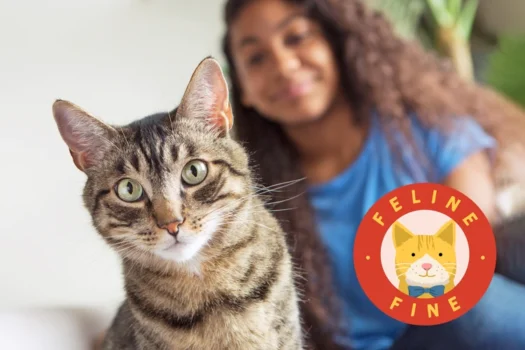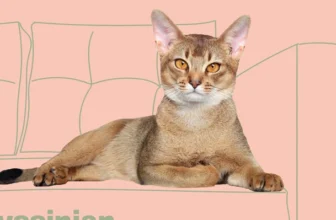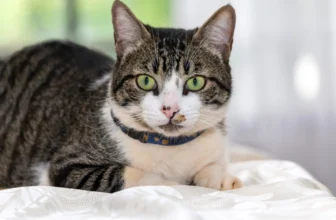As a cat owner, it can be difficult to recognize when your furry friend is suffering from anxiety. American Wirehairs are known for their affectionate and curious personalities, but even they can experience anxiety in certain situations. It’s important to be able to notice the signs of anxiety and understand the common causes. In this article, we’ll discuss the symptoms of anxiety in American Wirehairs, the common causes of anxiety, and provide helpful tips and strategies to help you manage and alleviate your cat’s anxiety. So, let’s dive in and learn how to recognize and support our furry friends when they’re feeling anxious.
Symptoms of Anxiety in American Wirehairs

It is not uncommon for American Wirehairs to experience anxiety, just like humans. However, since cats can’t tell us how they are feeling, recognizing signs of anxiety in them can be difficult. As caretakers, it is important to pay attention to any behavioral changes in your pet that might indicate anxiety. By being aware of the symptoms of anxiety in American Wirehairs, you will be better equipped to help your feline friend reduce their stress and improve their overall quality of life. Let’s explore some of the common symptoms of anxiety in American Wirehairs. For more tips on improving your cat’s mental health, check out our article on mental stimulation for American Wirehairs.
1. Increased Aggression
One sign that your American Wirehair may be experiencing anxiety is increased aggression. This can manifest as biting, scratching, or growling, particularly towards their owners or other animals in the household. It’s important to address this behavior as soon as possible, both for your own safety and for the well-being of your cat.
Causes: Aggressive behavior in American Wirehairs may be caused by a variety of factors, including anxiety or fear, territorial instincts, or feeling threatened or cornered. It’s important to identify the underlying cause in order to effectively address the behavior.
Solutions: There are several steps you can take to help reduce aggressive behavior in your American Wirehair:
| Solution | Description |
|---|---|
| Create a Safe Space: | Provide your American Wirehair with a designated area where they feel safe and secure. This can be a room or a comfortable bed in a less-busy area of your home. Encourage your cat to spend time in this space when they need some alone time. |
| Increase Playtime and Exercise: | Interactive playtime is a great way to release pent-up energy and anxiety in your American Wirehair. Use toys that stimulate their natural instincts, such as chasing or hunting. Regular exercise also helps your cat release tension and reduce anxiety. |
| Consider Medication: | In some cases, medication may be necessary to help manage your American Wirehair’s anxiety. Talk to your veterinarian about prescription options, as well as holistic remedies like herbal supplements or CBD oil. |
| Seek Professional Help: | If your American Wirehair’s aggressive behavior persists, it may be necessary to seek professional help from an animal behaviorist or trainer. They can help identify the underlying cause of the behavior and provide you with a customized plan to address it. |
It’s important to be patient and consistent when working to address aggressive behavior in your American Wirehair. With time and effort, it’s possible to help your cat feel more calm and comfortable in their environment. For more tips on reducing stress in your American Wirehair, check out our article on reducing stress in American Wirehairs and the benefits of interactive play.
2. Excessive Grooming
One potential symptom of anxiety in American Wirehairs is excessive grooming. While it’s normal for cats to groom themselves, an anxious cat may take it to the extreme. They may lick or chew on their fur to the point of causing skin irritation or even bald patches.
If you notice your American Wirehair spending an excessive amount of time grooming themselves, it’s important to pay attention to any changes in their behavior. Some cats may only groom in certain areas, such as their tails or bellies, while others may groom their entire body.
To determine if your cat is over-grooming due to anxiety, consider the surrounding circumstances. Do they groom more when they’re alone or during certain activities, such as loud sounds or changes in routine? Keep a record of their grooming habits and any other symptoms you may notice, so you can discuss them with your veterinarian.
Additionally, it’s important to rule out any potential medical issues that could be causing the excessive grooming. Skin conditions, allergies, and parasites can all cause cats to excessively groom themselves. Your veterinarian can run tests to determine if an underlying medical issue is contributing to your cat’s behavior.
If anxiety is determined to be the cause of your American Wirehair’s excessive grooming, there are steps you can take to help them feel more comfortable. Creating a safe space for your cat, increasing their playtime and exercise, and considering medication or professional help are all viable options.
It’s important to address the symptoms of anxiety in your American Wirehair as soon as possible. Untreated anxiety can lead to more serious health issues, such as feline depression. Check out our article on feline depression in American Wirehairs to learn more about the symptoms and treatment options.
On the other hand, incorporating calming activities into your cat’s routine, such as yoga or play therapy, can help ease their anxiety and promote their overall wellbeing.
3. Hiding or Avoidance
One of the most common signs of anxiety in your American Wirehair is hiding or avoidance. If you notice that your cat is spending more time under the bed or in closets, or avoiding interaction with family members or other pets, this could be a sign that something is bothering them. Here are some additional clues to look for:
- Reduced grooming: An anxious American Wirehair may not have the same interest in keeping themselves clean and hygienic. You may notice that their coat is not as shiny or well-groomed as usual.
- Physical tension: When cats feel anxious, they may hold their body tightly, with their ears pulled back and their tail tucked between their legs. Your cat may also have dilated pupils and may be breathing more rapidly than usual.
- Changes in appetite or elimination habits: Stress can cause cats to lose their appetite or become constipated or have diarrhea. If your cat’s litter box habits change suddenly, this could be another sign of anxiety.
- Avoidance of certain areas or objects: If your American Wirehair is avoiding a particular room or object, this could be another clue that they are feeling anxious about something. Try to observe their behavior and see if you can identify any patterns.
If you notice any of these symptoms in your American Wirehair, it’s important to take them seriously and try to identify the underlying cause. It could be something as simple as a change in their routine or environment, or it could be something more serious like an illness or injury. Talk to your veterinarian or a professional cat behaviorist to get more information on how to help your anxious American Wirehair.
4. Excessive Meowing or Yowling
If you notice that your American Wirehair is meowing or yowling excessively, it could be a sign of anxiety. This behavior can be particularly concerning if your cat is usually quiet. You may notice that your cat is meowing more than usual, or that their meows are louder and more intense than usual.
Some possible reasons for excessive meowing or yowling in American Wirehairs include separation anxiety, discomfort or pain, fear, and hunger. If your cat is meowing excessively and not responding to your usual attempts to calm them down, it may be time to investigate further.
Here are some signs to look out for with excessive meowing or yowling:
- An increase in the frequency and intensity of meows or yowls
- Meowing or yowling that occurs at odd hours or for no apparent reason
- Meowing or yowling that continues for long periods of time
- Meowing or yowling that is accompanied by other anxiety symptoms
If you notice these signs, it’s important to take action to help your cat. Some steps you can take include creating a safe space for your cat, providing them with more playtime and exercise, and considering medication or professional help.
Remember, excessive meowing or yowling can be a sign of anxiety or other health issues in your American Wirehair, so it’s always a good idea to seek veterinary advice if you have any concerns about your cat’s behavior. By addressing your pet’s anxiety, you can help them to live a happier and more fulfilling life.
5. Decreased Appetite
One sign of anxiety in American Wirehairs is a decreased appetite. If your cat is not interested in their food or is barely eating, it may be a sign of anxiety. Here are some of the possible reasons why your American Wirehair may have a decreased appetite:
- Stress: Anxiety and stress can cause your cat to lose their appetite. The fear and nervousness can affect their desire to eat, and they may lose interest in food.
- Nausea: Anxiety can also cause nausea, which can make your cat feel sick and not want to eat.
- Change in routine: If there has been a recent change in your American Wirehair’s routine, such as a change in food, feeding time or location, it may cause them to feel anxious and not want to eat.
It is essential to address decreased appetite in your American Wirehair as it can lead to health issues. If your cat has not eaten for more than 24 hours, it is best to consult a veterinarian to ensure that there is no underlying health problem. If anxiety is found to be the underlying issue, there are ways you can help your cat feel more relaxed and less stressed, such as creating a cozy and comfortable space for them and trying to maintain their routine as much as possible.
6. Restlessness
Restlessness is another common sign of anxiety in American Wirehairs. If you notice your cat constantly pacing, excessively moving around, or unable to stay still, there is a possibility that it is feeling anxious. Here are some additional signs that your American Wirehair may be experiencing restlessness due to anxiety:
- Excessive Scratching: Your cat may scratch at furniture, floors, or walls in an agitated manner.
- Excessive Licking: Your cat may excessively lick its paws or other body parts, sometimes resulting in hair loss or skin irritation.
- Difficulty Sleeping: Anxiety can make it difficult for your American Wirehair to relax and get a good night’s sleep.
- Pacing: Your cat may constantly move around the house or repeatedly walk back and forth in one specific area.
- Panting or Rapid Breathing: Your cat may breathe rapidly or pant, even when it is not physically active.
If you notice any of these signs of restlessness in your cat, it is important to take action to address its anxiety. Restlessness can lead to further health problems and can negatively impact your cat’s overall well-being.
Common Causes of Anxiety in American Wirehairs

As a responsible pet owner, it’s important to understand the causes behind your American Wirehair’s anxiety. Unexplained anxiety can lead to a host of problems and it’s always better to tackle the root cause rather than just manage the symptoms. Your furry friend may be susceptible to anxiety due to a range of reasons, including separation anxiety, fear of loud noises, changes in routine, and illness or pain. Let’s take a closer look at each of these potential triggers.
1. Separation Anxiety
It’s common for American Wirehairs to experience separation anxiety when their owners are away. This can manifest through destructive behavior, excessive meowing or yowling, and even depression.
In order to recognize separation anxiety in your American Wirehair, look for the following signs:
| Signs of Separation Anxiety | Description |
|---|---|
| Excessive meowing or yowling | Your American Wirehair may vocalize excessively when you leave the house, or when they are left alone in a room. |
| Destructive behavior | Chewing on furniture or other household objects, scratching at walls or doors, or urinating or defecating outside of the litter box may be signs of separation anxiety. |
| Depression or lethargy | If your American Wirehair seems sad or depressed when you leave and lacks their usual energy, this may also be a sign of separation anxiety. |
To help your American Wirehair cope with separation anxiety, consider the following tips:
1. Desensitization training: Gradually acclimate your cat to being alone through short periods of separation, and gradually increasing the duration.
2. Leave comfort items: Leave your cat with a toy or blanket that has your scent on it to provide comfort while you’re away.
3. Interactive toys: Provide your cat with toys that keep them engaged, such as puzzle toys or toys that dispense treats.
4. Consider medication: In severe cases, medication prescribed by a vet may help ease your cat’s anxiety.
Separation anxiety can be a challenging issue to address, but with patience and consistency, you can help your American Wirehair feel more comfortable when you’re away.
2. Fear of Loud Noises
Loud noises are a common source of anxiety for American Wirehairs. Thunderstorms, fireworks, and even loud music can trigger fear and anxiety in your furry friend. Here are some signs to look out for:
- Trembling: Your American Wirehair may start shaking or trembling at the sound of loud noises.
- Pacing: Your cat may start pacing around the house in an agitated state, searching for a place to hide.
- Hiding: If your American Wirehair is afraid of loud noises, they may try to hide in closets, under beds, or in other secluded areas of your home.
- Excessive Vocalizations: Fearful American Wirehairs may meow or yowl excessively in response to loud noises.
- Urinating or Defecating: In extreme cases, your cat may urinate or defecate outside of the litter box due to fear and anxiety.
It’s important to understand the root cause of your American Wirehair’s fear of loud noises. It may be associated with a traumatic experience in the past, or it may simply be a phobia that your cat has developed over time.
To help your feline companion overcome their fear of loud noises, there are a few things you can do. Firstly, try to create a safe space for your cat in a room that is soundproofed and away from windows. This will help to minimize the amount of noise your cat is exposed to.
Additionally, you can try using white noise to drown out loud sounds such as thunderstorms or fireworks. This can be achieved through the use of fans or white noise machines.
If your cat’s fear of loud noises is severe, you may need to seek professional help. Your vet may be able to recommend a behaviorist who can work with you and your cat to overcome this phobia. In some cases, medication may be prescribed to help your cat deal with their anxiety and fear.
Remember, patience and understanding are key when trying to help your anxious American Wirehair. With some time and effort, you can help your furry friend overcome their fear and live a happy, healthy life.
3. Changes in Routine
The American Wirehair is known for its loving and playful nature, but changes in routine can cause anxiety in this breed. Changes in routine can be as simple as a change in feeding schedule or a new litter box location. Wirehairs are creatures of habit, so any disruptions to their usual routine can be stressful.
To help your American Wirehair cope with changes in routine, it’s important to maintain a consistent routine as much as possible. This means feeding your cat at the same time every day and keeping their litter box in the same location. If you have to make a change, try to make it gradually so your cat has time to adjust. For example, if you need to transition your cat to a new food, mix the new food in gradually over a period of several days.
It’s also a good idea to provide your cat with plenty of mental stimulation and playtime. This will help them feel more confident and less anxious when their routine is disrupted. Consider investing in puzzle toys or setting up a cat tree near a window so your cat can watch birds or squirrels outside.
Additionally, creating a relaxing environment can be helpful in reducing your cat’s anxiety. This can include playing calming music, using pheromone sprays or diffusers, or providing your cat with a cozy bed or hiding spot to retreat to when they’re feeling stressed.
By being proactive and providing your American Wirehair with a stable routine, mental stimulation, and a relaxing environment, you can help reduce their anxiety when changes in routine occur.
4. Illness or Pain
A less common but significant cause of anxiety in American Wirehairs is illness or pain. Your Wirehair may experience discomfort or pain due to various underlying health conditions that could trigger anxiety. If your cat is displaying unusual behavior, combined with any physical symptoms, they could be linked to an underlying illness or pain. It’s essential to schedule a visit to your veterinarian.
Some common illnesses that could be causing anxiety in your American Wirehair include urinary tract infections, thyroid problems, or gastrointestinal issues. These health conditions may lead to changes in your cat’s behavior and could also cause physical symptoms, such as vomiting, diarrhea, or lethargy.
Your cat may also experience pain due to injuries, such as sprains or fractures. They may display anxiety as a result of their discomfort or as a defense mechanism to prevent further harm. It is essential to keep a close eye on your Wirehair’s behavior and monitor their physical condition regularly.
If you suspect any underlying illnesses or pain are causing your Wirehair’s anxiety, it’s crucial to schedule a visit to your veterinarian promptly. Your vet may perform various tests to diagnose any underlying health issues, and recommend appropriate treatments or medications to alleviate your cat’s pain and improve their overall well-being.
It’s vital to remain vigilant about your American Wirehair’s behavior and watch out for any physical symptoms. Identifying any underlying health issues or pain and seeking appropriate treatment can help alleviate your cat’s anxiety and prevent any further health problems.
How to Help your anxious American Wirehair
As pet owners, we all want our pets to feel safe and loved. Unfortunately, our American Wirehairs can become anxious and distressed, and this can have a negative impact on their health and wellbeing. If you suspect that your American Wirehair is suffering from anxiety, it’s important to take steps to help them feel more relaxed and at ease. In this section, we’ll explore some practical steps that you can take to support your anxious American Wirehair. Let’s get started!
1. Create a Safe Space
Creating a safe space is one of the most important steps in helping an anxious American Wirehair cat feel secure and comfortable. Here are some ways to create a safe space:
- Find a quiet spot: Choose a quiet and peaceful location in your home where your cat can feel relaxed and safe. This is particularly important if your cat is sensitive to loud noises or disruptions.
- Provide a cozy environment: Make the chosen location warm and comfortable for your cat. You can place a soft blanket or bed in the area, along with some of their favorite toys or treats.
- Limit access: To ensure your cat feels secure, you may want to limit access to this safe space. Consider putting up a baby gate or installing a cat flap to prevent other pets or people from entering the area.
- Use pheromone products: Pheromone products, such as sprays and diffusers, can help to create a calming environment for your anxious American Wirehair. These products emit synthetic pheromones that can help to reduce stress and anxiety in your cat.
Remember that creating a safe space for your cat is not a one-time event. It’s an ongoing process that requires you to pay close attention to your cat’s behavior and adjust their environment accordingly. By providing a safe space, you can help your anxious American Wirehair feel secure and reduce their anxiety levels.
2. Increase Playtime and Exercise
When it comes to helping your anxious American Wirehair, one effective method is to increase their playtime and exercise. This can help channel their nervous energy into something positive and give them a sense of routine and structure.
Advantages of increasing playtime and exercise
| Advantages | Description |
|---|---|
| Reduces Stress | Playing and exercising can release endorphins, which promote feelings of happiness and reduce stress in your cat. |
| Promotes Bonding | Playing with your cat can strengthen your bond and deepen your relationship with them. |
| Improves Health | Regular exercise can improve your cat’s overall health, including their weight and cardiovascular system. |
| Provides Stimulation | Playing with your cat can provide them with mental stimulation and stave off boredom, which can be a trigger for anxiety. |
Ways to increase playtime and exercise
There are many ways you can increase your American Wirehair’s playtime and exercise:
| Methods | Description |
|---|---|
| Interactive Toys | Interactive toys, such as feather wands or laser pointers, can engage your cat and provide mental and physical stimulation. |
| Scratching Posts | A scratching post can provide your cat with an outlet for their natural behaviors and help them exercise their muscles. |
| Treat Dispensers | Treat dispensers or puzzle toys can provide mental stimulation for your cat, while also rewarding them for their behavior. |
| Outdoor Enclosures | An outdoor enclosure, such as a catio or screened-in porch, can provide your cat with fresh air, mental stimulation, and a safe space to explore. |
By increasing your American Wirehair’s playtime and exercise, you can not only help reduce their anxiety but also improve their overall health and well-being. It’s important to remember to start off slowly and gradually increase the amount of playtime and exercise, especially if your cat is new to it. Always consult with your veterinarian before making any significant changes to your cat’s routine.
3. Consider Medication
When dealing with an anxious American Wirehair, medication can be an option to consider. However, it is important to note that medications should not be the first solution and should only be used under the guidance and supervision of a veterinarian.
There are several types of medication that can be prescribed to help calm your cat’s anxiety. Here’s an overview:
| Medication Type | Description |
|---|---|
| Anti-anxiety medication | This type of medication is designed to help reduce anxiety symptoms by affecting the levels of certain neurotransmitters in the brain. Some commonly prescribed anti-anxiety medications for cats include fluoxetine and clomipramine. |
| Benzodiazepines | Benzodiazepines are a type of sedative medication that can help calm your cat in stressful situations. These medications work by enhancing the effects of certain neurotransmitters in the brain. Diazepam and lorazepam are commonly prescribed benzodiazepines for cats. |
| Beta-blockers | Beta-blockers are typically used to address excessive meowing, pacing, and other hyperactive behaviors that may accompany anxiety. These medications work by reducing the effects of adrenaline on the body. Atenolol is a commonly prescribed beta-blocker for cats. |
It is important to keep in mind that not all medications are suitable for every cat. The type of medication that is prescribed will depend on your cat’s specific symptoms and medical history. Additionally, medication should always be used in conjunction with other anxiety management strategies, such as creating a safe space and increasing playtime and exercise.
If you choose to pursue medication as a treatment option, be sure to discuss any concerns or side effects with your veterinarian. They will be able to provide you with guidance on how to safely and effectively administer medication to your anxious American Wirehair.
4. Seek Professional Help
When dealing with an anxious American Wirehair, seeking professional help should be considered if the above methods fail to make any significant improvements. A veterinarian or animal behaviorist can provide an accurate diagnosis of the underlying cause of anxiety and can recommend a personalized treatment plan.
Below are some options for seeking professional help:
| Option | Description |
|---|---|
| 1. Veterinary Consultation | If you suspect that your American Wirehair’s anxiety may be related to a medical condition, an initial visit to the veterinarian is necessary. The vet can diagnose any underlying health problem which may be causing the anxiety and recommend appropriate medication to help alleviate symptoms. |
| 2. Animal Behaviorist Consultation | The services of an animal behaviorist may be necessary to help your American Wirehair overcome their anxiety. They can come to your home and observe your cat’s behavior in its usual surroundings, which can help identify any triggers which may be causing the anxiety. The behaviorist can then recommend different techniques to help change your cat’s behavior and alleviate anxiety symptoms. |
| 3. Medication with Veterinary Supervision | If your American Wirehair’s anxiety is severe, medication may be recommended. Medications available for cats suffering from anxiety include anti-anxiety drugs and antidepressants, among others. It is crucial to note that medication should only be used under the supervision of a veterinarian, as some medications can cause adverse side effects or interact with other medications your cat may be taking. |
Remember: Seeking professional help is an important step in managing your American Wirehair’s anxiety. It is essential to stay patient and work closely with your veterinarian or behaviorist to develop a treatment plan that suits your cat’s individual needs. With the right plan in place, your cat can live a happy, healthy, and anxiety-free life.
Conclusion
In conclusion, it is important to recognize the signs of anxiety in your American Wirehair and take appropriate steps to help them manage it. Ignoring the symptoms can lead to further anxiety and potentially even more serious health problems.
Remember, increased aggression, hiding, excessive grooming, restlessness, excessive meowing, and decreased appetite can all be indicators of anxiety in your pet. Understanding the common causes, such as separation anxiety, fear of loud noises, changes in routine, and illness/pain, can help you address the root of the problem.
There are several ways to help your anxious American Wirehair, including creating a safe space, increasing playtime and exercise, considering medication, and seeking professional help. It’s important to note that what works for one cat may not work for another, so be patient and willing to try different approaches.
By taking the time to understand your American Wirehair’s behavior and addressing any anxiety issues they may have, you can help them live a happier and healthier life. Remember to always prioritize your pet’s well-being and seek professional help when needed.
Frequently Asked Questions
1. Can American Wirehairs develop anxiety?
Yes, just like any other cat breed, American Wirehairs can develop anxiety due to various reasons such as changes in routine, separation anxiety, and illness or pain.
2. What are the signs of anxiety in American Wirehairs?
The signs of anxiety in American Wirehairs include increased aggression, excessive grooming, hiding or avoidance, excessive meowing or yowling, decreased appetite, and restlessness.
3. Is it common for American Wirehairs to experience separation anxiety?
Yes, separation anxiety is a common cause of anxiety in American Wirehairs. They form strong bonds with their owners and may become anxious when left alone for extended periods.
4. How can I create a safe space for my anxious American Wirehair?
You can create a safe space for your anxious American Wirehair by providing them with a quiet and secluded area where they can retreat to when they feel anxious. This can be a cozy cat bed or a designated room.
5. Can exercise help relieve my American Wirehair’s anxiety?
Yes, regular playtime and exercise can help relieve your American Wirehair’s anxiety by reducing stress and keeping them mentally stimulated.
6. Should I consider medication for my anxious American Wirehair?
If your American Wirehair’s anxiety is severe, medication may be prescribed by a veterinarian. However, it is always best to consult with a vet before administering any medication to your cat.
7. What changes in routine can cause anxiety in American Wirehairs?
Changes in routine such as moving to a new home, new family members, or a new pet can cause anxiety in American Wirehairs.
8. Can illness or pain be a cause of anxiety in American Wirehairs?
Yes, illness or pain can be a cause of anxiety in American Wirehairs. If you notice any changes in your cat’s behavior, it is always best to consult with a veterinarian to rule out any underlying health issues.
9. How can I help my American Wirehair feel more comfortable during loud noises?
You can help your American Wirehair feel more comfortable during loud noises by creating a quiet space for them, playing calming music, or using pheromone sprays or diffusers.
10. When should I seek professional help for my anxious American Wirehair?
You should seek professional help for your anxious American Wirehair if their anxiety is severe and affecting their daily life or if you have tried various methods to relieve their anxiety without success.







